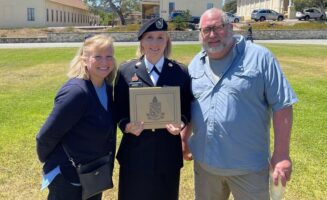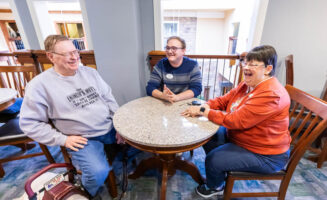HOME People & Culture
Podcasts

Get used to diabetes checkups being a call or click away
Podcast: Dr. David Newman provides virtual care from Fargo, North Dakota

What shared nursing governance looks like in North Dakota
Podcast: Sanford Bismarck VP of nursing on debriefing after tough days, ‘Zen Den’ and repeat success

Cancer patient rep has new title: Breast cancer survivor
Podcast: Lynn Roemeling shares her journey from employee to patient at Sanford Health

Innovative solutions keep senior care close to home
Podcast: Good Samaritan Society CEO chats with two nursing home leaders making an early impact

Virtual care becomes everyday practice
Podcast: Some primary care, mental health providers see all of their patients online

How SDSU is preparing nurses for rural care
Podcast: Dr. Mary Anne Krogh prepares nurses for rural care at South Dakota State University

Sanford’s journey to zero preventable harm
Podcast: Why every doctor, nurse, and employee receives high-reliability skills training

A senior nursing student chats about her career path
Podcast: New RN and her mentor share what makes nursing at Sanford Health different

Caring for patients while making health systems better
Podcast: Meet Dr. Robert Wachter, professor, author and pandemic-era social media influencer

NDSU’s advances in nursing school keep human touch
Podcast: High fidelity simulators are giving nursing students real scenarios to enhance learning
Recent Stories

End-of-life care a passion for hospice social worker
Alison Rowell provides care and support in many ways for patients and families

Nurse turned clinic director is now nurse leadership fellow
2024 recipient of Becky Nelson Fellowship has spent 20+ years at Sanford

2 Good Samaritan Society leaders named national Rising Stars
McKnight's program honors standouts in skilled nursing, senior living and home care

‘Global nurses’ revel in personal, professional growth
Mentors partner from near and far to grow mother-child care overseas

Emergency prep is everyday work for Army reservist
Sgt. Liz Kodet, emergency management specialist, is Sanford’s Veteran of the Year

Sanford nurse retires after 60 years of service
Carol Wieneke has been an LPN at Sanford Luverne for over half a century

Sanford offers apprenticeship in health care professions
Try a new career with a four-week paid rotation in high-demand jobs

Research path runs from rural South to South Dakota
Doctoral student finds new community in colleagues at Sanford Research

Stephanie Herseth Sandlin joins Board of Trustees
Augustana president, attorney, former lawmaker adds to Sanford governance

Young man leaves delivery job for senior center family
Admin assistant started his Good Samaritan Society career while still in high school
Cancer
Children's Health
Heart
Orthopedics
Research
Senior Services
Innovations
News
- Sanford Fargo now offers AI-assisted colonoscopies
- Sanford USD Medical Center makes World’s Best Hospitals list
- Sanford earns 3 of Top 100 Critical Access Hospital Awards
- Sanford addresses telehealth’s role in rural communities
- 2 Good Samaritan Society leaders named national Rising Stars
- More in News
Sanford Health Foundation
- Employees Give $416,022 During Month-long Celebration of Gratitude
- Meet Isaac, the 2024 Ambassador for Sanford Children’s in Sioux Falls
- Honoring Norma Peltier: A Legacy of Giving For Good In Fargo
- One Last Wish to Make a Difference
- Owen’s Story: Beating the Odds With Support from Sanford Children’s
- More in Sanford Health Foundation







